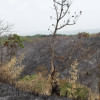Protect Mro community from violent land grabbers

We are appalled by the news of an attack on over a dozen homes in a Mro village in Bandarban's Lama upazila on Monday. The attackers are allegedly involved with a rubber plantation in the area and their goal, it appears, was to intimidate the indigenous people and drive them out of their land. As per our report, members of the community were even able to identify a few people who led the attack. When contacted, Kamal Uddin, Lama Rubber Industries Limited's manager, denied the allegations of the attack. However, he insisted that the villagers were building new houses on 400 acres of land that belonged to the company, not to the community. The Mro people, on the other hand, say the land in question is their ancestral home, and as such, belong to them.
What is more infuriating is that this is not the first such attack on the community. According to previous reports, the company has been attempting to drive out indigenous people for some time in order to seize their land. The locals accused its employees of torching crops on more than 300 acres of land belonging to the three villages' indigenous population on April 26 last year. They also claimed that criminals poisoned a small water flow in the hills near Rengyan Mro Para on September 6.

These are acts of terrorism and should be dealt with accordingly. However, the state seems unwilling to take proper action against the perpetrators, despite repeated appeals by the Mro community for protection.
What makes the issue particularly complicated is that the Mro community does not have rights to their ancestral land, as land rights were never transferred to them. Instead, the state has been transferring land rights to companies that are driving out indigenous people to make space for their commercial projects. These business interests are often linked with powerful quarters and perpetrators are therefore able to carry out acts of violence against indigenous people with impunity. This is not acceptable. The state needs to take proper steps to transfer land rights to indigenous people and make sure that nobody can attempt to drive them out of their ancestral land.
It is not just the land of the Mro villages that has been under threat. Since 1997, other indigenous groups in the Chittagong Hill Tracts have also lost their land to other private rubber plantation owners and horticulturists. The indigenous population of Madhupur and Dinajpur experienced the same thing. Such repression of the indigenous community is reprehensible.
It is evident that the Bangladeshi government's failure to implement the CHT Accord fully, particularly the provisions dictating the traditional land rights of the indigenous communities in the region, has pushed them towards insecurity, aggression and violence. We urge the state to take all necessary measures to protect the rights of the indigenous people. It must investigate the continuous threats and attacks on the Mro community in Bangladesh, take urgent actions against the perpetrators and provide protection to the families who have been living their lives in fear.


 For all latest news, follow The Daily Star's Google News channel.
For all latest news, follow The Daily Star's Google News channel. 







Comments